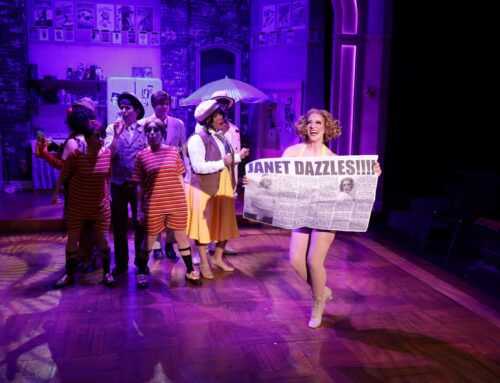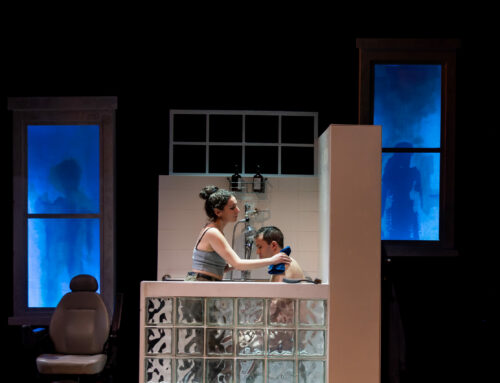Tennessee Williams’ lyrical soul has come to life onstage at the A.R.T. in a play that can break your heart. THE GLASS MENAGERIE is a poignant masterpiece about a southern family searching for solace in a rough world that has left them shattered and picking up the pieces. The autobiographical work was a Pulitzer Prize-winning triumph for the playwright who brought his own ghosts to the stage in a delicate tempest of shadow and half light. Through a kind of luminous language of the heart, Williams spoke the truth of his own ache and longing, his family’s broken dreams, and the pain of disillusion that comes with being human.
As amber light breaks on a spare set– half dream, half real– distant, beautiful music hovers in the air as Tennessee’s stand-in Tom Wingfield emerges from the shadows and speaks to us with a poet’s soul. Tony Award-winning director John Tiffany’s graceful hand, Natasha Katz’s lighting, Bob Crowley’s set and costume design, and Clive Goodwin and Nico Muhly’s original sound-scape immediately mesmerize. A moat of water, mirror-like, surrounds and reflects the platformed stage; the boundaries of this remembered world are as fluid as time and space. We are at once somewhere intimate and faraway. Gently, Tom leads us into the pristinely etched corners of his memory and we find ourselves in the middle of a precarious threesome: his jilted mother– a faded southern belle and now tattered matriarch, his sickly and withdrawn sister, and him–an acutely aware and stifled young man whose family’s unhappiness intensifies his own.
The Wingfield family is as fragile as the delicate young heroine at its heart– Laura, lost in her shyness, her physical wounds, and her menagerie of transparent figurines. Her mother Amanda has a will of iron and will corral a few unsuspecting gentleman callers for her daughter if it’s the last thing she does. Mr. Wingfield who is simply gone, has left a gaping hole behind; pity the young men who will be brought home by brother Tom to fill it. These gentleman callers will be called upon to fill an abyss of wanting.
The performances take us to a new place; Cherry Jones ‘Amanda Wingfield is built of sturdier stuff than previous incarnations I’ve witnessed. She is a vivacious southern matron, unfailingly gracious, with a throaty edge to her southern charm. When she comes to dinner trailing clouds of past glory in a frightfully fluffy gown, she is truly funny, beguiling even in her dilapidation, but no less poignant for hanging onto the promise of the past. Later, she will nobly disguise her disappointment in front of the Gentleman caller who is not “calling” after all, and will instead, unleash her full fury on her beleaguered son. We do not cringe– we sympathize; this Amanda seems almost justifiably angry. In short, Cherry has invested Amanda great dignity, making these scenes of disillusionment somehow bearable.
Similarly, Celia Keenan-Bolger as the agonizingly shy Laura seems to draw on the sturdier stuff of her mother’s character, and rises to the occasion of the gentleman caller’s visit with a delicate verve I’ve not seen in this character before. In fact, she barely seems physically damaged– with only a hint of the brace that once crippled her self-confidence. I felt for her, rather than embarrassed for her. As for the Gentleman caller, Brian J. Smith manages a neat trick: he is the all American can-do guy who seems sincerely– if only temporarily –transported by Laura. He makes us believe he has magically glimpsed this pale gem of a girl and will never be able to forget her. Their dance and the fracturing of Laura’s beloved glass unicorn seemed as much a breakthrough as a shattering of illusion.
Only Zachary Quinto left me a little adrift. His Tom seemed disengaged, and one note; I wanted to feel the layers of his frustration and guilt at not being able to fill the void, not just the shadow of his leaving hanging over them. I would urge him more shades of grey and less gloom. I was stirred– if not quite shaken–but this is a lovely and alive production that reveals new facets in an endlessly shimmering work.
See THE GLASS MENAGERIE at the American Repertory Theater through March 17.






Leave A Comment
You must be logged in to post a comment.